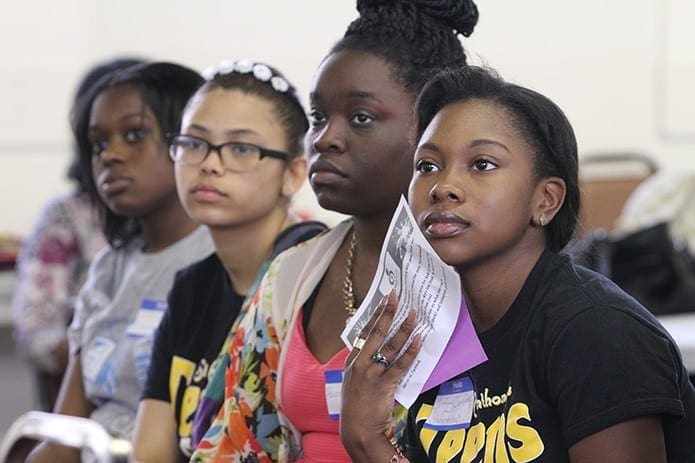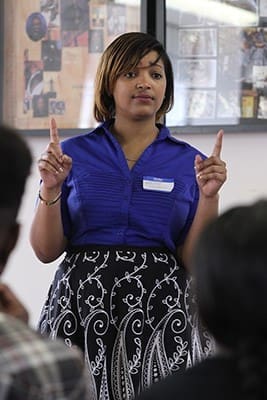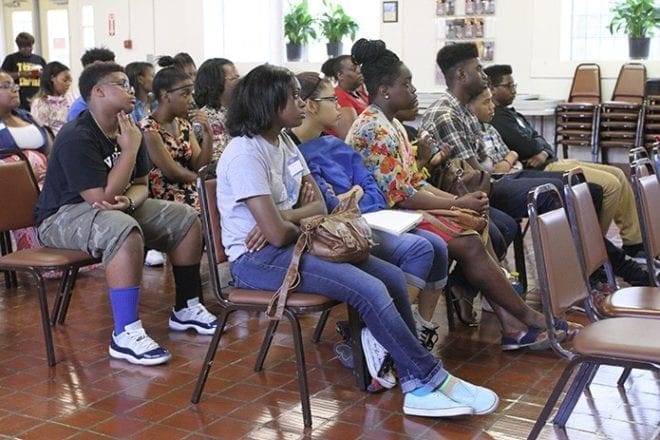 Photo By Michael Alexander
Photo By Michael AlexanderWorkshop enjoins teens to be ‘powerful voices’ against human trafficking
By ERIKA ANDERSON, Special to the Bulletin | Published May 14, 2015
ATLANTA—Homework. College applications. Extra-curricular activities. Developing friendships. The pressures of being a teenager in today’s world can be overwhelming. And as dozens of teens learned at a special event at St. Anthony of Padua Church, that world also can be full of danger.
A human/child trafficking workshop hosted April 26 by the youth groups of St. Anthony, Sts. Peter and Paul Church, Decatur, and Our Lady of Lourdes Church, Atlanta, featured a training from staff from youthSpark, Inc. Originally founded as a nonprofit arm of the Fulton County Juvenile Court, youthSpark is committed to ending child sex trafficking. The organization aims to transform the lives of children who have been exploited, abused and neglected.
At St. Anthony, students in grades six through 12 gathered in Adamski Hall. Though the mood was lighthearted, the discussion was serious, as Jennifer Swain, the End Child Sex Trafficking program director of youthSpark, talked about the statistics facing the students and their peers.
“Today is not designed to scare you; it’s not made to make you feel scared to go to school or walk around your neighborhoods,” Swain said. “But as a young person, you’re going to know someone is in trouble before I know. So you are the most powerful voices in all of this.”

Jennifer Swain, end child sex trafficking program director for youthSpark Atlanta, leads the teen workshop at St. Anthony of Padua Church. Founded 15 years ago, youthSpark was created to serve victims of child sex trafficking. It also works to end child sex trafficking through prevention, early intervention and youth-empowered education. Photo By Michael Alexander
The goal of youthSpark training, Swain said, is to make young people feel empowered when they know something is wrong.
“You might be someone’s saving grace someday,” she said. “This is one problem that cannot be taken care of by the police alone. The community needs to take hold of this.”
Although known by several different terms, the Commercial Sexual Exploitation of Children (CSEC) is a growing issue in the U.S. According to the youthSpark website, CSEC involves the exploitation of any child for purposes such as prostitution or child pornography. Often, a predator—or pimp—exploits a child in exchange for providing his or her basic needs, such as food, shelter or access to education. CSEC garners big business in the U.S. and throughout the world. Annually, human trafficking produces $7 billion to $10 billion worldwide. In the U.S., 300,000 children each year become victims of CSEC. And according to FBI statistics, Atlanta is a major hub for this crime, ranking among the top 14 cities for CSEC. The average age a child enters into prostitution is 12 years old.
Swain told the teens that when a young person runs away, one in three will be approached by child sex traffickers within 48 hours.
“This happens in every culture. In every community. And it looks different in all of them,” she said.
Swain added that media culture has desensitized many Americans to the issue of human trafficking.
“All the stuff we see on TV, all the stuff we hear in our music, that is not real,” she said. “Music tells us as women that we have to be sexier, that we have to show a little more of our bodies. It also tells men that they don’t have to respect women. This is one of the reasons we have this problem.”
Swain encouraged the young people to speak up if they or someone they know was in trouble.
“You need to find someone other than your parents who you can talk to—a teacher or pastor or school counselor—just one adult you can trust,” she said. “We can change this. It will take a lot of years, but prevention is the best protection.”

Teens and parents from some of the city of Atlanta Catholic churches were invited to St. Anthony of Padua Church to participate in an April 26 workshop on human trafficking entitled “What Every Teen Should Know.” The workshop was presented by youthSpark Atlanta. Photo By Michael Alexander
She also reminded the teens not to judge others who may be acting out of fear or lack of protection from the adults in their lives.
“Don’t laugh or make fun of the girls who are acting out sexually. Or the ones who were introverted and suddenly become promiscuous. Step up and say ‘that’s not cool.’ We don’t know what she’s been through,” she said. “You are all now ambassadors. Keep this conversation alive. Make sure it leaves the room. Tell others what you’ve learned. If you leave here and tell three people about what you’ve learned, you’ve done your jobs as ambassadors.”
Many parents, such as Kim Brannan Sykes from St. Anthony, attended the event with their teens. Sykes said she tries to keep conversation open with her 16-year-old son Brandon.
“As a parent, I try to make sure he is aware of all the dangers out there, especially with social media. I don’t want to scare him, but I want to make sure he is prepared for the real world,” she said. “(Events like this one) allow us to have open, honest conversations.”
For teens like Danielle Kirkland, 16, from St. Anthony, Swain’s talk reminded her not to judge others.
“If I’m with other people and they’re laughing at a girl for the way she dresses or something, maybe instead of laughing, I should reflect and listen to their stories,” she said. “We don’t know what people are going through. Maybe those clothes were all she could afford, or she’s going through something like this at home.”
Pierre Monette Jr., who leads the youth and young adult groups from the three parishes who sponsored the event, said the churches are also doing workshops for adults, but he found it important for his youth groups to hear, as well.
“This is something that could affect any of these children. We need to teach them to protect the body as well as the spirit. Some people said this was too serious. Life is serious,” he said. “We need to give our young people positive information—these are the seeds they need to protect themselves or someone else.”